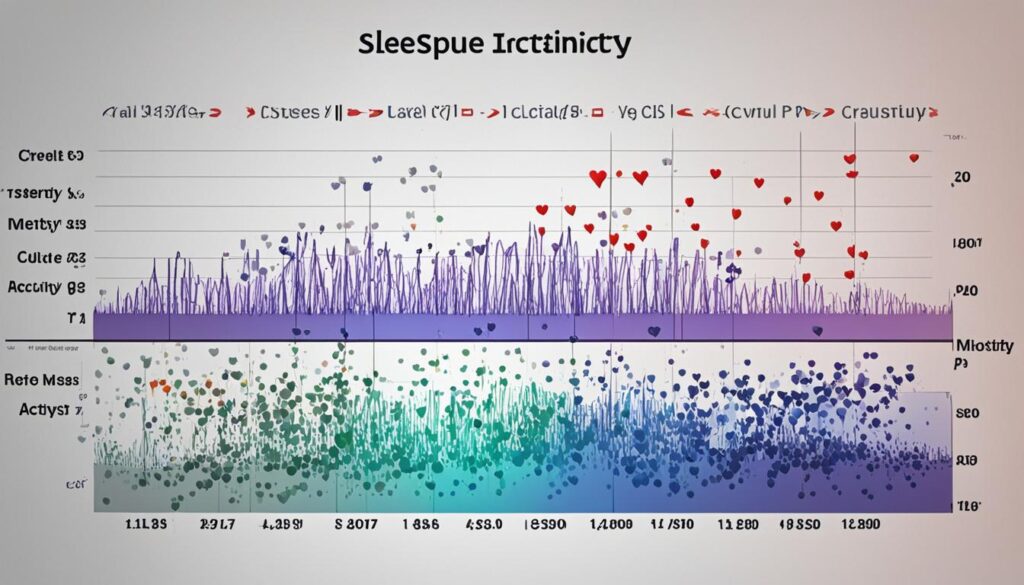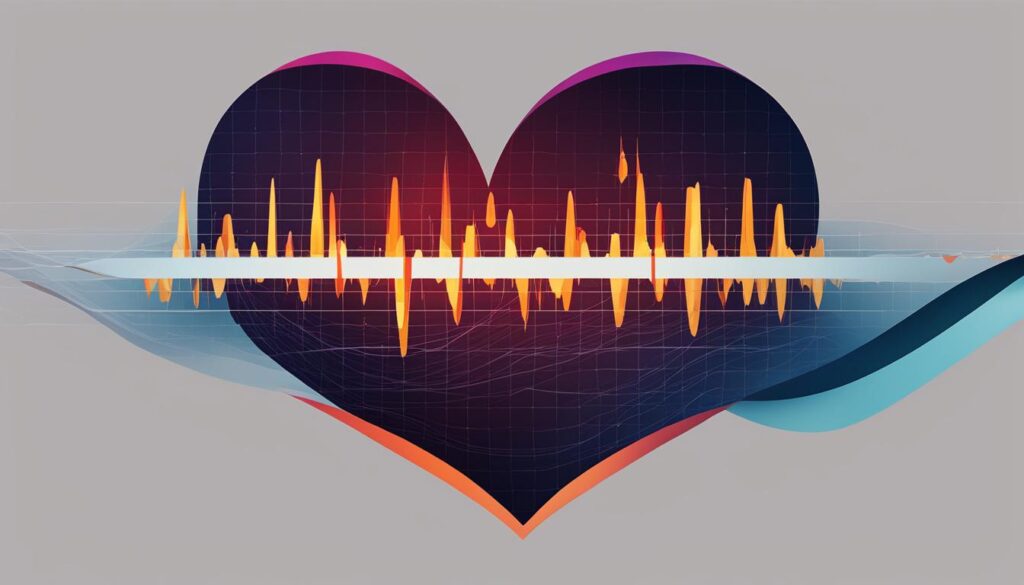Sleep is a vital component of our overall health and well-being. It plays a crucial role in rejuvenating our bodies and minds, allowing us to wake up refreshed and ready to take on the day. Today we will explore during which stage of sleep do your heart rate and blood pressure increase, impacting overall cardiovascular health and sleep quality. Let’s delve into the fascinating relationship between sleep stages and cardiovascular activity.
Key Takeaways:
- Heart rate and blood pressure increase during specific stages of sleep
- Understanding the relationship between sleep stages and cardiovascular health is crucial
- REM sleep and NREM sleep have different impacts on heart rate and blood pressure
- Monitoring heart rate during sleep can provide insights into cardiovascular health
- Sleep disorders can significantly affect heart rate and blood pressure
The Complex Relationship Between Sleep and Cardiovascular Health
The impact of sleep on cardiovascular health is a fascinating and complex topic. Sleep and cardiovascular health have a reciprocal relationship, with each influencing the other. Adequate, quality sleep is essential for maintaining good heart health, while sleep disruptions can increase the risk of cardiovascular disease. Let’s explore the importance of sleep for heart health and the connection between sleep and heart disease.
Poor sleep quality and duration have been linked to an increased risk of cardiovascular disease. Research has shown that individuals who consistently get less sleep or experience poor sleep quality are more prone to conditions such as high blood pressure, heart disease, stroke, and irregular heart rhythms. Lack of sleep can disrupt the body’s circadian rhythms and impair functions that regulate blood pressure, inflammation, and glucose metabolism, leading to detrimental effects on heart health.
Furthermore, certain sleep disorders, such as sleep apnea, have a significant impact on cardiovascular health. Sleep apnea is characterized by repeated interruptions in breathing during sleep, leading to oxygen deprivation and increased stress on the heart. This condition has been strongly associated with an increased risk of hypertension, heart failure, arrhythmias, and other cardiovascular complications.
On the other hand, cardiovascular health can also affect sleep quality. For example, individuals with heart disease may be more prone to experiencing sleep disturbances due to symptoms like chest pain, shortness of breath, or nocturnal angina. Medications used to treat cardiovascular conditions can also interfere with sleep patterns, leading to sleep disturbances or insomnia.
Quality sleep is crucial for maintaining optimal cardiovascular health. Disruptions in sleep can increase the risk of heart disease and other cardiovascular complications.
It is vital to prioritize sleep and implement strategies to improve sleep quality for the sake of heart health. Establishing a consistent sleep schedule, practising good sleep hygiene, and creating a restful sleep environment are essential steps. Additionally, managing stress levels, maintaining a healthy diet and weight, and engaging in regular physical activity also contribute to better sleep and overall cardiovascular health.
By understanding the complex relationship between sleep and cardiovascular health, we can take proactive measures to protect our hearts and promote healthier sleep patterns. It is crucial to consult with healthcare professionals if experiencing sleep disturbances or concerns about heart health to receive proper evaluation and guidance.
Understanding the Sleep Cycle: An Overview
The sleep cycle is a recurring pattern of different stages of sleep that our bodies go through during a typical night’s rest. It plays a crucial role in maintaining our overall health and well-being. Let’s explore the stages of sleep and the duration and pattern of a typical sleep cycle.
The Stages of Sleep: NREM and REM
The sleep cycle consists of two main stages: NREM (Non-Rapid Eye Movement) sleep and REM (Rapid Eye Movement) sleep. These stages differ in terms of brain activity, bodily functions, and their effects on our cognition and well-being.
NREM sleep is further divided into three stages: N1, N2, and N3. During N1, we transition from wakefulness to sleep. This stage is characterized by light sleep and is considered a transitional period. In N2, our brain activity slows down, and our body temperature and heart rate decrease. This stage makes up a significant portion of our sleep cycle, accounting for around 45-55% of total sleep time. Finally, N3 is the deepest stage of NREM sleep, also known as slow-wave sleep. Our brain waves slow down, and our body enters into a state of relaxation and restoration.
REM sleep, on the other hand, is a stage characterized by rapid eye movements, increased brain activity, and vivid dreaming. It typically occurs after NREM sleep and makes up around 20-25% of total sleep time.
Duration and Pattern of a Typical Sleep Cycle
A typical sleep cycle lasts about 90-110 minutes and consists of alternating stages of NREM and REM sleep. This cycle repeats multiple times throughout the night, creating a rhythm that allows us to experience the benefits of each stage. The pattern of the sleep cycle can vary between individuals, but a general pattern is observed.
At the beginning of the night, we tend to have longer periods of NREM sleep, with increased time spent in the deep N3 stage. As the night progresses, REM sleep becomes more predominant, and the duration of NREM sleep decreases. During the final stages of the sleep cycle, REM sleep may constitute a larger portion of the cycle, allowing for more dreams and brain activity.
Understanding the sleep cycle and its stages is essential for optimizing our sleep habits and promoting better sleep quality. By prioritizing all stages of sleep and maintaining a consistent sleep schedule, we can support our overall health and well-being.

During Which Stage of Sleep Do Your Heart Rate and Blood Pressure Increase
Heart rate and blood pressure increase during REM sleep, which is characterized by increased brain activity and dreaming. This increase in cardiovascular activity during REM sleep is a normal physiological response. Understanding the specific sleep stage during which heart rate and blood pressure increase can provide insights into cardiovascular health during sleep.

During REM sleep, heart rate and blood pressure fluctuate, demonstrating increased activity compared to other sleep stages. This is thought to be related to the heightened brain activity and vivid dreaming that occur during this stage. REM sleep is essential for cognitive functions and emotional processing, and the cardiovascular changes that accompany it are a normal part of the sleep cycle.
Other sleep stages:
Heart rate and blood pressure generally decrease during NREM sleep, which includes stages 1, 2, 3, and 4. These stages are characterized by slower brain waves and reduced muscle activity. However, variations in heart rate and blood pressure can occur within these stages, particularly during stages 3 and 4 sleep, also known as slow-wave sleep or deep sleep.
It is important to note that the fluctuations in heart rate and blood pressure during sleep are part of the body’s natural physiological processes. Monitoring these changes can provide valuable information about cardiovascular health during sleep.
“Understanding the impact of sleep stages on heart rate and blood pressure can aid in the evaluation of cardiovascular health during sleep.”
| Sleep Stage | Heart Rate | Blood Pressure |
|---|---|---|
| REM Sleep | Increases | Increases |
| NREM Sleep (Stages 1-2) | Decreases | Decreases |
| NREM Sleep (Stages 3-4) | Variations | Variations |
The Significance of REM Sleep on Cardiovascular Function
REM sleep, also known as Rapid Eye Movement sleep, plays a crucial role in regulating heart rate and blood pressure during sleep. Understanding the impact of REM sleep on cardiovascular function is essential for overall heart health.
REM Sleep and Heart Rate Dynamics
During REM sleep, heart rate dynamics can vary significantly. Some individuals may experience an increase in heart rate, while others may observe a decrease. These variations in heart rate during REM sleep are influenced by factors such as emotional state, sleep disorders, and overall cardiovascular health. Monitoring heart rate during REM sleep can provide valuable insights into heart health and sleep quality.
REM Sleep and Blood Pressure Fluctuations
Similarly, blood pressure fluctuations can occur during REM sleep. This stage of sleep is characterized by increased brain activity, vivid dreaming, and rapid eye movements. Blood pressure can vary depending on the content of dreams, emotional experiences during REM sleep, and the individual’s overall cardiovascular health. Understanding these fluctuations can help in assessing cardiovascular function during sleep.

NREM Sleep and Its Impact on Heart Rate and Blood Pressure
NREM (Non-Rapid Eye Movement) sleep, also known as deep sleep, plays a significant role in regulating heart rate and blood pressure during sleep. While REM sleep is often associated with changes in cardiovascular activity, NREM sleep should not be overlooked.
What Happens to Your Heart Rate and Blood Pressure During NREM?
During NREM sleep, heart rate and blood pressure generally decrease compared to wakefulness. This decrease is a normal physiological response as the body enters a state of deep relaxation and restoration.
However, it is important to note that variations in heart rate and blood pressure can occur during different stages of NREM sleep. Particularly, stage 3 and stage 4 NREM sleep, also known as slow-wave sleep, are characterized by slower brain waves and increased physical recovery.
Heart Rate and Blood Pressure Variations in Stages 3 and 4 of Sleep
During stage 3 and 4 NREM sleep, heart rate and blood pressure may fluctuate. While heart rate and blood pressure generally remain lower than during wakefulness, there may be variations within these stages.
These variations in heart rate and blood pressure during stage 3 and 4 NREM sleep can be influenced by factors such as physical activity, stress levels, and overall cardiovascular health. It is essential to consider these factors when assessing the impact of NREM sleep on heart rate and blood pressure.

What Causes Changes in Heart Rate and Blood Pressure During Sleep?
Changes in heart rate and blood pressure during sleep can be influenced by a variety of factors. Understanding these causes is crucial for identifying potential risk factors and improving cardiovascular health. Two key factors that play a significant role in regulating cardiovascular activity during sleep are the autonomic nervous system and external influences.
The Role of the Autonomic Nervous System During Sleep
The autonomic nervous system is responsible for controlling involuntary bodily functions, including heart rate and blood pressure. It consists of two branches: the sympathetic nervous system and the parasympathetic nervous system. During sleep, the autonomic nervous system works to maintain homeostasis and regulate cardiovascular activity based on the body’s needs.
The sympathetic nervous system, also known as the “fight-or-flight” response, can cause an increase in heart rate and blood pressure. This response is typically active during periods of stress or arousal. On the other hand, the parasympathetic nervous system, or the “rest-and-digest” response, is responsible for promoting relaxation and lowering heart rate and blood pressure.
As the body transitions through different sleep stages, there are changes in autonomic nervous system activity, leading to fluctuations in heart rate and blood pressure. These changes are part of the normal sleep process and help optimize cardiovascular function during rest.
External Factors Influencing Cardiovascular Activity While Asleep
External factors can also influence heart rate and blood pressure during sleep. Here are some key factors to consider:
- Environmental factors: Temperature, noise, and lighting conditions in the sleep environment can impact sleep quality and cardiovascular activity. Sleep in a cool, dark, and quiet room to promote optimal sleep and cardiovascular health.
- Sleep disorders: Conditions like sleep apnea, insomnia, and restless leg syndrome can disrupt normal sleep patterns and lead to abnormal changes in heart rate and blood pressure. Effective management of sleep disorders is essential for maintaining cardiovascular health during sleep.
- Medications: Certain medications, such as beta-blockers or stimulants, can affect heart rate and blood pressure regulation during sleep. It is important to discuss any concerns about medication effects on sleep with a healthcare provider.
- Lifestyle choices: Factors such as smoking, excessive alcohol consumption, poor diet, sedentary lifestyle, and high-stress levels can contribute to changes in heart rate and blood pressure during sleep. Adopting a healthy lifestyle that includes regular physical activity, a balanced diet, and stress management techniques can help promote cardiovascular health during sleep.
By considering the role of the autonomic nervous system and external factors, we can gain a better understanding of the causes of changes in heart rate and blood pressure during sleep. This knowledge empowers us to make informed decisions and take action to improve our cardiovascular health while we sleep.
Monitoring Your Heart: Understanding Normal Sleep Heart Rates
Monitoring your heart rate during sleep can provide valuable insights into your cardiovascular health. By understanding what is considered a normal sleep heart rate, you can better assess your overall heart health during the night. Sleep heart rates can vary based on age and individual factors, so it’s important to have a benchmark for comparison.
What Is a Normal Sleeping Heart Rate by Age?
The range of normal sleeping heart rates can vary depending on your age. Generally, a normal sleeping heart rate for adults is between 60 and 100 beats per minute. However, infants can have higher heart rates ranging from 100 to 160 beats per minute while sleeping.
As we age, our heart rates tend to decrease. Here are the average sleeping heart rates by age:
| Age | Average Sleeping Heart Rate (beats per minute) |
|---|---|
| 0-3 months | 100-160 |
| 3-6 months | 90-150 |
| 6-12 months | 80-140 |
| 1-3 years | 70-120 |
| 3-5 years | 65-110 |
| 6-12 years | 60-95 |
| 13-18 years | 55-85 |
| Adults | 60-100 |
These ranges are meant to provide a general guideline. However, individual variations may occur, so it’s always best to consult with a healthcare professional for a more accurate assessment of your specific situation.
Average Heart Rate Sleeping Woman vs. Man
On average, there may be slight differences in heart rate between women and men during sleep. However, these differences are typically minimal and not clinically significant. Factors such as age, fitness level, and overall health can have a more significant impact on heart rate than gender. It’s important to focus on what is considered normal for you as an individual.
By monitoring your heart rate during sleep and understanding the range of normal sleeping heart rates, you can gain valuable insights into your cardiovascular health. If you have concerns about your sleep heart rate or suspect any underlying heart conditions, it is always recommended to consult with a healthcare professional for a comprehensive evaluation.
The Effects of Sleep Disorders on Heart Rate and Blood Pressure
Sleep disorders can have a significant impact on heart rate and blood pressure. One of the most common sleep disorders, sleep apnea, is strongly associated with cardiovascular irregularities and an increased risk of heart disease. Sleep apnea is characterized by repeated interruptions in breathing during sleep, leading to drops in oxygen levels and sudden awakenings. These disruptions can cause sudden spikes in heart rate while sleeping, as the body tries to compensate for the lack of oxygen.
The effects of sleep disorders on heart rate and blood pressure can have serious implications for cardiovascular health. The continuous strain on the heart due to abnormal sleep patterns can lead to the development of hypertension and other heart-related conditions. It is essential to address sleep disorders promptly to mitigate their impact on heart health and overall well-being.
Connecting Sleep Apnea With Cardiovascular Irregularities
Sleep apnea, characterized by recurrent pauses in breathing during sleep, can cause significant cardiovascular irregularities. When a person with sleep apnea experiences an apnea episode, the brain sends signals to the body to wake up and resume normal breathing. These intermittent awakenings disrupt the sleep cycle, prevent the body from entering deep sleep stages, and ultimately affect heart rate and blood pressure regulation. The repetitive drop and rise in oxygen levels during sleep apnea events can lead to hypertension, arrhythmias, and even heart failure.
Addressing Sudden Spikes in Heart Rate While Sleeping
Sudden spikes in heart rate during sleep can be alarming and indicative of underlying sleep disorders or other health conditions. Besides sleep apnea, other factors can contribute to these spikes, such as anxiety, stress, or certain medications. It is crucial to consult a healthcare professional if you experience sudden and significant fluctuations in heart rate while sleeping to determine the underlying cause and develop an appropriate treatment plan.
In summary, sleep disorders, particularly sleep apnea, can have profound effects on heart rate and blood pressure. Managing and treating sleep disorders is essential for maintaining heart health and preventing cardiovascular complications. Sudden spikes in heart rate during sleep should be evaluated to identify any potential underlying sleep disorders or health conditions. By addressing sleep disorders and prioritizing sleep quality, individuals can help protect their cardiovascular well-being.
How Lifestyle Affects Sleep-Related Heart Rate and Blood Pressure
Lifestyle factors play a significant role in determining sleep-related heart rate and blood pressure. Several key factors, such as diet, exercise, and stress management, can influence cardiovascular health during sleep. Understanding the impact of lifestyle choices on sleep-related heart rate and blood pressure is crucial for maintaining optimal heart health and improving sleep quality.
Influence of Diet and Exercise on Sleep and Cardiovascular Health
Diet and exercise have a profound impact on sleep quality and cardiovascular health. A balanced diet and regular physical activity contribute to better sleep patterns, which in turn can help regulate heart rate and blood pressure during sleep. Eating a healthy diet that includes fruits, vegetables, whole grains, and lean proteins can provide essential nutrients that support cardiovascular health and promote restful sleep. Moreover, engaging in regular exercise helps to reduce stress, improves circulation, and enhances sleep quality, ultimately benefiting heart health and sleep-related cardiovascular function.
Stress and Its Impact on Sleep-Staged Heart Rate and Blood Pressure
Stress levels and management are closely intertwined with sleep-staged heart rate and blood pressure. Chronic stress can disrupt sleep patterns, leading to increased heart rate and blood pressure during sleep. Managing stress through relaxation techniques like meditation, mindfulness, and deep breathing exercises can promote better sleep and help regulate heart rate and blood pressure. Additionally, establishing healthy coping mechanisms and maintaining a work-life balance can significantly reduce stress levels, leading to improved cardiovascular health and better sleep quality.
Adopting a healthy lifestyle that includes a balanced diet, regular exercise, and effective stress management techniques can have a positive impact on sleep-related heart rate and blood pressure. By making conscious choices to prioritize cardiovascular health and sleep quality, individuals can enhance their overall well-being and reduce the risk of sleep-related cardiovascular complications.
Conclusion
After exploring the intricate relationship between sleep and cardiovascular health, we have discovered that sleep stages, notably REM (Rapid Eye Movement) and NREM (Non-Rapid Eye Movement) sleep, play a crucial role in impacting heart rate and blood pressure during sleep. It is essential to understand how these sleep stages affect cardiovascular activity to assess heart health accurately during sleep.
Sleep disorders can have a significant impact on heart rate and blood pressure, increasing the risk of cardiovascular disease. Conditions such as sleep apnea can cause irregularities in heart rate and blood pressure, emphasizing the importance of addressing sleep disorders for maintaining heart health.
Incorporating healthy lifestyle habits, including maintaining a balanced diet, engaging in regular exercise, and managing stress levels, can positively influence sleep-related heart rate and blood pressure. By adopting these healthy habits, individuals can contribute to overall cardiovascular health and improve sleep quality. Regular monitoring and management of heart rate during sleep are vital for optimal heart health.
In conclusion, understanding the relationship between sleep stages, heart rate, and blood pressure provides valuable insights into cardiovascular health during sleep. By prioritizing sleep quality, addressing sleep disorders, and adopting a healthy lifestyle, individuals can promote optimal cardiovascular function and enhance their overall sleep experience.
FAQ
During which stage of sleep do your heart rate and blood pressure increase?
Heart rate and blood pressure increase during REM (Rapid Eye Movement) sleep, which is characterized by increased brain activity and dreaming.
What happens in stage 3 of sleep?
Stage 3 of sleep is part of NREM (Non-Rapid Eye Movement) sleep and is characterized by slow-wave sleep, with deep and restorative brain activity occurring.
What stage of sleep does the heart rate increase?
Heart rate increases during REM (Rapid Eye Movement) sleep, the stage where most dreaming occurs.
Why is my sleeping heart rate higher than resting?
It is normal for the heart rate to be slightly higher during sleep compared to rest, as the body transitions through different sleep stages and physiological changes occur.
What is too low of a heart rate while sleeping?
A heart rate below 40-60 beats per minute while sleeping may be considered too low and should be evaluated by a healthcare professional.
What is a normal sleeping heart rate by age?
The normal sleeping heart rate can vary by age, with an average range of 40-100 beats per minute in adults. Infants and children tend to have higher heart rates during sleep compared to adults.
How does sleep apnea affect heart rate?
Sleep apnea, a sleep disorder characterized by pauses in breathing, can lead to fluctuations in heart rate and increase the risk of cardiovascular irregularities and heart disease.
How do lifestyle factors affect sleep-related heart rate and blood pressure?
Diet, exercise, and stress levels can influence sleep quality and heart rate and blood pressure during sleep. Adopting a healthy lifestyle can improve sleep-related cardiovascular health.
What is the connection between sleep and cardiovascular health?
Sleep and cardiovascular health have a complex relationship, with poor sleep increasing the risk of cardiovascular disease. Adequate, quality sleep is essential for maintaining optimal heart health.
How does the autonomic nervous system influence heart rate and blood pressure during sleep?
The autonomic nervous system plays a significant role in regulating cardiovascular activity during sleep, controlling changes in heart rate and blood pressure.
How do sleep stages impact heart rate and blood pressure?
Heart rate and blood pressure generally decrease during NREM (Non-Rapid Eye Movement) sleep compared to wakefulness. However, heart rate increases during REM (Rapid Eye Movement) sleep, while NREM sleep, particularly stage 3 and 4, may have variations in heart rate and blood pressure.




